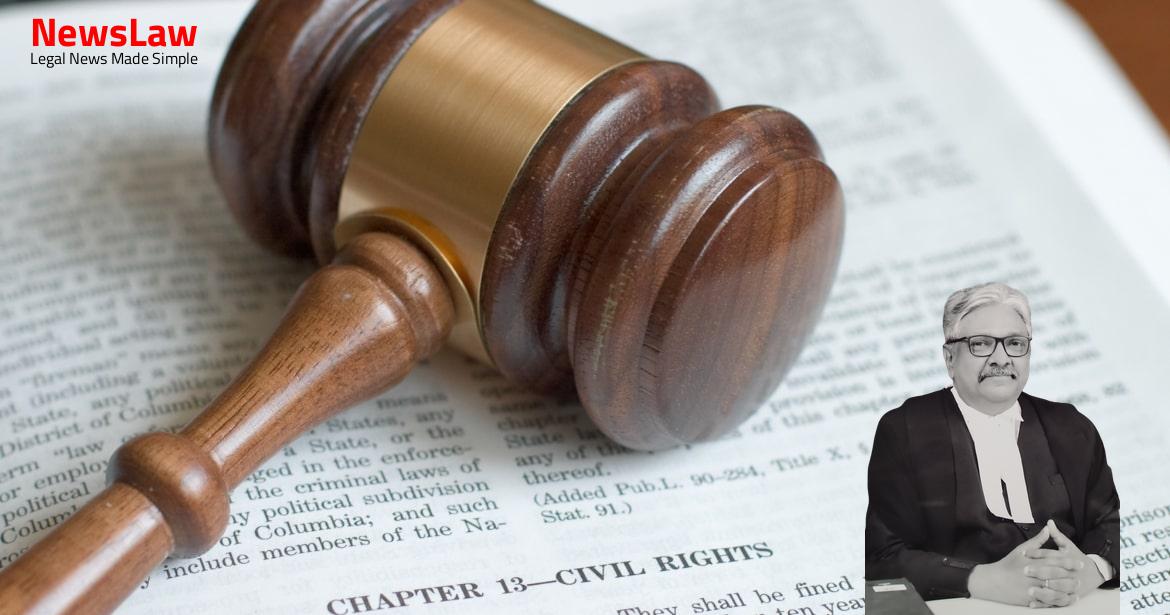2000 OF 2022 (arising out of Special Leave Petition (Crl.) No 3566 of 2020) WITH CRIMINAL APPEAL NO. 2002 OF 2022 (arising out of Special Leave Petition (Crl.)
No 3567 of 2020) WITH CRIMINAL APPEAL NO. 2 herein is one of the Director of Ravi Organics Limited, a private limited 2 company, engaged in the manufacturing and sales of various types of chemicals. 802276 of Union Bank of India, Muzaffarnagar, for a sum of Rs.10 lakhs dated 20.11.2012 issued by the respondent no. 24632 of 2013 seeking quashing of the summoning order dated 18.02.2013 passed by the Magistrate and also the order dated 02.12.2013 passed by the Sessions Court. 1
The operative portion of the impugned judgment reads as under: – “Considering the facts and circumstance of the present case, according to the complaint itself, the cheque was issued for Pawan Hardware Store, Sandeep talkies, near Court Road, Civil Lines, Muzaffar Nagar by the Director, Devendra Kumar Garg- petitioner. Chief Judicial Magistrate, Court No.2, Muzaffar Nagar in Criminal Case No.162 of 2013,
Pawan Kumar Goel Vs.
Also Read: https://newslaw.in/supreme-court/assessment-of-loss-of-earning-capacity-in-motor-accident-claim/
Anubhav Kumar, learned counsel for the appellant submitted that the cheque issued by Respondent No 2 towards payment of outstanding dues of supply of material due to the Appellant was dishonoured and hence the respondent is guilty of committing offence under the Negotiable Instruments Act and was righly summoned by the Trial Court to face the trial.
1 It was also submitted that it is well settled by a catena of decisions that if a complaint under Section 138 of NI Act is filed in respect of array of cheque issued from the account of the company, it is incumbent on the part of the complainant to make necessary averments in the complaint that at the time when the offence was committed, the person accused was in charge of and responsible for the conduct and business of the company. (2) Whether a complaint under Section 138 of NI Act would be liable to be proceeded against the director of the company without their being any averments in the complaint that the director arrayed as an accused was in charge of and responsible for the conduct and business of the company. — Where any cheque drawn by a person on an account maintained by him with a banker for payment of any amount of money to another person from out of that account for the discharge, in whole or in part, of any debt or other liability, is returned by the bank unpaid, either because of the amount of money standing to the credit of that account is insufficient to honour the cheque or that it exceeds the amount arranged to be paid from that account by an agreement made with that bank, such person shall be deemed to have committed an offence and shall, without prejudice to any other provisions of this Act, be punished with imprisonment for [a term which may be extended to two years], or with fine which may extend to twice the amount of the cheque, or with both: Provided that nothing contained in this section shall apply unless— (a) the cheque has been presented to the bank within a period of six months from the date on which it is drawn or within the period of its validity, whichever is earlier; (b) the payee or the holder in due course of the cheque, as the case may be, makes a demand for the payment of the said amount of money by giving a notice in writing, to the drawer of the cheque
Section 141 of NI Act deals with offences by companies while extending the liability to every individual; who when the offence was committed was responsible for the conduct of the business which also extends towards key managerial positions like that of the Director. (2) Notwithstanding anything contained in sub-section (1), where any offence under this Act has been committed by a company and it is proved that the offence has been committed with the consent or connivance of, or is attributable to, any neglect on the part of, any director, manager, secretary or other officer of the company, such director, manager, secretary or other officer shall also be deemed to be guilty of that offence and shall be liable to be proceeded against and punished accordingly. Having regard to section 141, when a cheque issued by a company (incorporated under the Companies Act, 1956) is dishonoured, in addition to the company, the following persons are deemed to be guilty of the offence and shall be liable to be proceeded against and punished : 7 11 (i) every person who at the time the offence was committed, was in charge of and was responsible to the company for the conduct of the business of the company; (ii) any Director, Manager, Secretary or other officer of the company with whose consent and connivance, the offence under section 138 has been committed; and (iii) any Director, Manager, Secretary or other officer of the company whose negligence resulted in the offence under section 138 of the Act, being committed by the company.
The scheme of the Act, therefore is, that a person who is responsible to the company for the conduct of the business of the company and who is in charge of business of the company is vicariously liable by reason only of his fulfilling the requirements of sub- section (1). Sub-section (2) of section 141 provides that a Director, Manager, Secretary or other officer, though not in charge of the conduct of the business of the company will be liable if the offence had been committed with his consent or connivance or if the offence was a result of any negligence on his part. ….What is required is that the persons who are sought to be made criminally liable under Section 141 should be at the time the offence was committed, in charge of and responsible to the company for the conduct of the business of the company. Conversely, a person not holding any office or designation in a Company may be liable if he satisfies the main requirement of being in charge of and responsible for conduct of business of a Company at the relevant time. If the Magistrate is satisfied that there are averments which bring the case within Section 141, he would issue the process.
Coming to the facts of the present case at hand, a perusal of the complaint filed as Annexure P-1 clearly goes to establish two facts :- 14 (i) The description of the respondent-accused contained in the complaint is as under :- “Mr. This Court has been firm with the stand that if the complainant fails to make specific averments against the company in the complaint for the commission of an offence under Section 138 of NI Act, the same cannot be rectified by taking recourse to general principles of criminal jurisprudence. The complaint was lodged only against the appellant without arraigning the company as an accused. Thus, the words “as well as the company” appearing in the Section make it absolutely unmistakably clear that when the company can be prosecuted, then only the persons mentioned in the other categories could be vicariously liable for the offence subject to the averments in the petition and proof thereof.
The observations made in the aforesaid judgment is also a complete answer to the arguments advanced by learned counsel for the appellant that in the absence of any prohibition under the NI Act, the amendment in the complaint is permissible and the impleadment of an additional accused subsequent to filing of the complaint, would not be barred.
Those ingredients are: (1) that a person drew a cheque on an account maintained by him with the banker; (2) that such cheque when presented to the bank is returned by the bank unpaid; (3) that such a cheque was presented to the bank within a period of six months from the date it was drawn or within the period of its validity whichever is earlier; (4) that the payee demanded in writing from the drawer of the cheque the payment of the amount of money due under the cheque to payee; and (5) such a notice of payment is made within a period of 30 days from the date of the receipt of the information by the payee from the bank regarding the return of the cheque as unpaid. The identity of the drawer of the cheque is necessarily required to be known to the complainant (payee) and needs investigation and would not normally be in dispute unless the person who is alleged to have drawn a cheque disputes that very fact. The other facts required to be proved for securing the punishment of the person who drew a cheque that eventually got dishonoured is that the payee of the cheque did in fact comply with each one of the steps contemplated under Section 138 of the Act before initiating prosecution. Therefore, Parliament declared under Section 142 that the provisions dealing with taking cognizance contained in the CrPC should give way to the procedure prescribed under Section 142. In view of the above, arguments advanced by learned counsel for the appellant that an additional accused can be impleaded subsequent to the filing of the complaint merits no consideration, once the limitation prescribed for taking cognizance of the offence under Section 142 of NI Act has expired.
The decision in Modi Distillery has to be treated to be restricted to its own facts as has been explained by us hereinabove.” As already stated above, a perusal of the complaint goes to show that even though respondent no. After laying up claim many times by Complainant, defendant on 15.12.2012 asked the complainant to produce the said cheque in his bank for entrenchment after four-five days, it will be cleared, complainant believed the defendant. On 24.12.2012, he was informed by his bank that the cheque amount exceeds arrangement made on 22.12.2012 by defendant’s bank i.e., Union Bank of India and thus, the said cheque was dishonoured. The following questions were referred for consideration :- 22 “ (a)
Also Read: https://newslaw.in/supreme-court/enhancement-of-compensation-in-workmens-compensation-act-case/
Whether for purposes of Section 141 of the Negotiable Instruments Act, 1881, it is sufficient if the substance of the allegation read as a whole fulfill the requirements of the said section and it is not necessary to specifically state in the complaint that the person accused was in charge of, or responsible for, the conduct of the company.
Case Title: PAWAN KUMAR GOEL Vs. STATE OF U.P. (2022 INSC 1212)
Case Number: Crl.A. No.-001999-001999 / 2022



